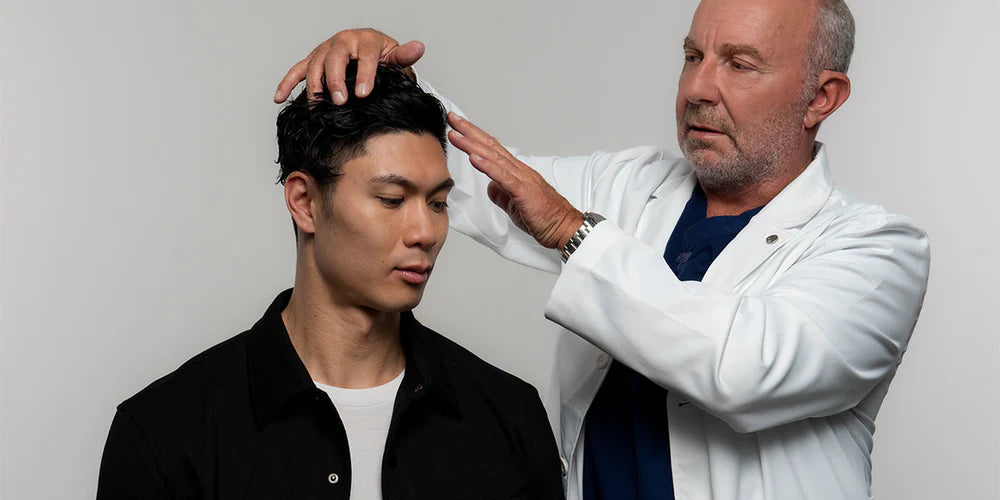What’s one reason why some people get good results with hair loss treatment and others get great results? Treatment compliance. It’s making sure that you’re following your prescribing doctor’s instructions and being as consistent as possible with taking your medication.
Why does this matter? First, every medication is associated with a level of risk, so we want to minimize this risk as much as possible. Second, not all treatments are formulated the same way, which is why specific recommendations for dosing are needed. Third, how you respond to treatment and whether you regrow hair or simply maintain what you have is determined by genetics. Patience is an essential part of any hair loss treatment, regardless of its potency and/or efficacy. Changing how much treatment you take and when you take it (without first consulting with your doctor) will make it that much harder to assess whether a treatment is working for you. And in the worst-case scenario, it could come with safety risks.
Dr. Christina Han, a board-certified dermatologist and Medical Director at XYON explains why it’s so important to follow the treatment plan created for you by your prescribing doctor.
I don't think finasteride is working. I'm following my doctor's instructions but I'm not seeing results.
“Here’s the reality: if you don’t treat pattern hair loss, it’s going to get worse. If you do decide to treat it, it’s going to take some time before you see results. When counselling my own patients, I take the time to explain to them that successful hair loss treatment can be measured in two ways: first, that there’s a reduction and/or halting of hair loss and second, that there’s actual regrowth of hair. Both are considered good responses and indicate that treatment is working.
Whether someone will regrow their hair or simply just maintain what they have will depend on individual factors such as how long they’ve been experiencing hair loss, the area(s) affected by hair loss and genetic variability in treatment response. This is why I advise my patients that they should stick with a hair loss treatment for at least 6 months (9-12 months ideally) before determination of efficacy and/or considering switching or adding other treatments.”
I'm noticing more shedding on finasteride. Should I stop taking my treatment?
“This is common and expected. Any hair loss medication, whether taken orally or topically, can result in increased shedding within the first few months of starting treatment. The reason this happens is due to changes in the hair growth cycle. Telogen (resting) hairs are shed to reset the hair growth cycle and allow for new anagen (actively growing) hairs. Fortunately, this shedding is temporary for most patients. If it continues after being on therapy for three months, that’s when I would recommend discontinuing treatment and getting reassessed by their doctor.
In general, I encourage my patients to continue with therapy if they tolerate it, since this type of shedding tends to resolve on its own. But I completely understand how it can be discouraging for patients to see increased hair loss when starting a treatment. If you’re experiencing shedding and are worried, I’d reach out to your prescribing doctor. Remember, you can contact your prescribing doctor directly through the XYON platform. You can also read up on finasteride shedding and minoxidil shedding by visiting those articles in the XYON medical library.”
I missed a finasteride dose. What should I do? Will this affect my results?
“I always recommend doing your best to use your hair loss treatment as prescribed by your doctor to give your hair follicles the best chance at success. Missed doses or inconsistent dosing can lead to suboptimal results. To make things easier for yourself, you can try and incorporate taking your treatment at a time that’s easy for you to remember (e.g. when styling your hair, after toothbrushing or setting an alarm). If you miss a dose, do not double up on medication. Just resume your usual dosing as soon as you remember or can.”
I don't think I need to take my treatment every day.
“There are many reasons why patients might need to adjust your dosing, but the important thing is that you talk to your doctor before doing so. When we write prescriptions, we choose the dose that we think will give our patients the greatest benefit when it comes to hair regrowth, but sometimes there could be issues with side effects or a lack of a response that might require us to change a treatment plan. Hair regrowth is one of the most challenging and slowest processes I counsel my patients on, but the key message here is that consistency is key in ensuring the best possibility of slowing loss and potentially regrowing hair.”
The bottom line on treatment compliance
At XYON, we put a lot of emphasis on making sure that anyone interested in having their hair loss assessed and treated is seen by an expert in the field. We also take great care in formulating medicated treatments designed to deliver results for our patients while minimizing the risk of unwanted side effects. We can’t control what you decide to do in the privacy of your homes, our recommendation has always been that you should follow your prescribing doctor’s instructions when it comes to dosing. It’s one way that you can help us help you and increase the chances of your treatment being successful, while keeping yourself safe at the same time.




